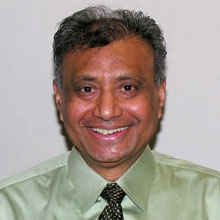
Hariharan Swaminathan, head of the Department of Educational Psychology at the Neag School of Education and a renowned research expert in his field of educational measurement, has been selected as a 2010 Fellow by the American Educational Research Association.
Swaminathan, who has co-written two books on item response theory, was honored with 66 other fellows at AERA’s annual meeting May 1 in Denver.
Neag Dean Thomas DeFranco praised Swaminathan, saying the honor was well deserved. “This award is a testament to his work and expertise in the educational statistics community and honors a lifetime of excellence devoted to scholarship and research in the field of educational measurement,” DeFranco said.
“The AERA Fellows are known both nationally and internationally for their outstanding contributions to education research,” a recent AERA press release said, adding that AERA aims “to underscore to new scholars the importance of sustained research contributions in the field.”
Besides his research and administrative activities, Swaminathan teaches a sequence of graduate courses in educational statistics ranging from basic to advanced.
He has done significant work for the state on the Connecticut Mastery Tests in developing a vertical scale for assessing the growth of children as they progress through grades. He, along with colleague H. Jane Rogers and doctoral student Burcu Kaniskan, has developed a growth curve prediction system “so we can identify kids who may be at risk and start working with them,” he says, calling the measure an “early warning system” and joking that his nickname, “Swami,” is apt for his line of work.
Much of his work is on the intricacies of measurement theory. Using item response theory, his area of expertise, he has developed procedures for establishing a common measurement scale that enables comparisons of students even when they are administered different tests. He has also developed procedures for assessing bias in testing and was commissioned by the Florida Supreme Court to evaluate that state’s bar exam.
The controversy in testing today, he says, is in the matter of accountability. “We want to find out if a teacher is effective or not. … There’s a lot of interest in that – even going as far as identifying weak teachers and weeding them out.” But he quickly adds, “Not all students are created equal,” and student failure cannot be attributed directly to teachers.
Swaminathan spent 30 years as professor, associate dean and acting dean at the University of Massachusetts in Amherst. He was a professor at the University of Miami and a principal research scientist at Educational Testing Service. He holds a B.S. with honors in mathematics from Dalhousie University, Halifax, Canada, and an M.S. in mathematics, an M.Ed., and a Ph.D. from the University of Toronto, Canada, specializing in psychometrics, statistics and educational measurement/evaluation.
He has delivered papers and taught workshops in countries that include The Netherlands, Russia, Australia, Singapore, Spain, Egypt and Indonesia. He was instrumental in designing and implementing a national assessment system for the Republic of Georgia, and has served as a consultant to numerous testing agencies, states and foreign ministries.
He received the College Outstanding Teacher award from the University of Massachusetts and the Jacob Cohen Award for Distinguished Teaching and Mentoring from the American Psychological Association. In Connecticut, he was honored by Gov. M. Jodi Rell in 2009 for outstanding contributions by a naturalized citizen.
The AERA Fellows Program is in its third year and has designated 471 for this honor among its membership of 25,000 educational researchers. Other Fellows at the Neag School are Joseph S. Renzulli and Scott W. Brown.
 Facebook
Facebook
 Twitter
Twitter
 LinkedIn
LinkedIn
